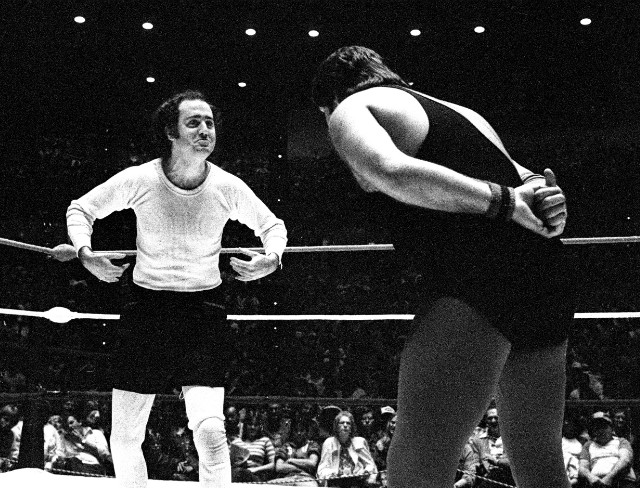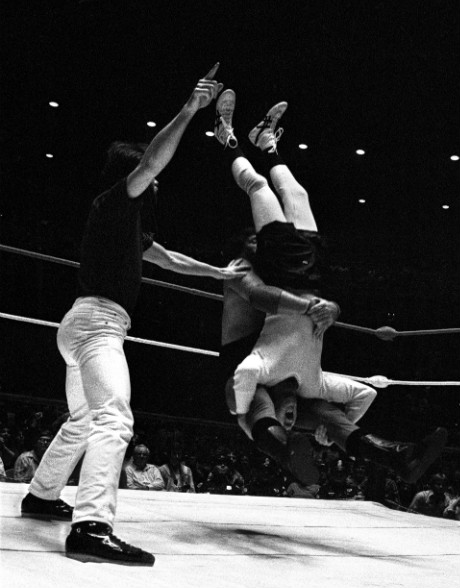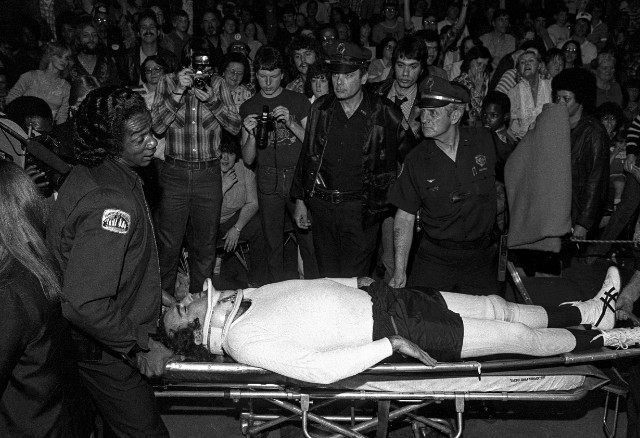
Andy Kaufman danced around the wrestling ring in a ridiculous outfit and jumped up and down like an ape. The star of the hit TV show "Taxi" pointed to his head and mocked the Memphis crowd.
"I'm from Hollywood. I have brains!" he declared.
Fans pelted him with Dixie cups.
On this April night 30 years ago, the New York native worked fans inside the Mid-South Coliseum into a chaotic frenzy. In a river town notorious for its rough-and-tumble roots, the coliseum was crammed with the rowdiest characters Memphis had to offer.
The place reeked of Jack Daniels, Marlboro and Skoal. So dangerous was the crowd that one wrestler carried a shank at all times after being stabbed by a fan.
Long before comedian Sacha Baron Cohen's Borat hit the screen, there was Kaufman, the comedic genius with wiry hair and bulging eyes who pushed the envelope of performance art on a real-time stage. And the whole wrestling episode -- inside the ring and out -- was performance art at its peak. For Kaufman, the fact that so few people caught on made it all the better.
"The reason he's still remembered is he took that idea of being a despicable bad guy and he took it to a whole new level," says Bob Thompson, a professor of pop culture at Syracuse University.
"His badness came not from wanting to take over the world; his badness came from being just so irritating. This was a character, probably more than any I can think of in American popular culture history, that within seconds of hearing him open his mouth, you really wanted to hit him in the face."
Kaufman's wrestling antics would later be immortalized in his infamous expletive-laced tirade on "Late Night with David Letterman," in the R.E.M. song "Man on the Moon" and in the Jim Carrey movie by the same name.
But there in the ring, Kaufman proved to be what everyone in Memphis already knew: The nation's biggest wuss. He'd sent videos showing residents how to use soap, he'd proclaimed Memphis to be the nation's redneck capital, he'd wrestled women in a city where they were only to be respected.
The way the pencil-necked geek pranced around the ring with his chest swelled, the way he scratched his armpits like a monkey -- well, by God, the arrogant som'bitch needed a whooping.
He'd accepted a challenge from Jerry "The King" Lawler, the city's heroic champion. But when the bell chimed, Kaufman avoided Lawler at all cost, running around the ring as fast as he could as soon the barrel-chested king approached. A frustrated Lawler, playing his part to the hilt, climbed from the ring and grabbed the PA microphone.
"Did you come down here to wrestle or act like an ass?" Lawler said to wild cheers.

It was the start of one of the greatest ruses of all time, when two men captivated an entire city and puzzled the nation, when Kaufman became the most hated person to ever walk the streets of Memphis.
Their act would get wilder and crazier in the ensuing months, with more matches and more taunts.
As a 10-year-old, I watched the drama unfold from the sixth row. It was genuinely exquisite to witness the night when the King gave the twerp what he deserved.
To be honest, the name Andy Kaufman still makes me nauseated, the way he dumped on us. I'm also well aware this makes me among the ultimate dupes, a kid who fell for the whole thing: Kaufman's broken vertebrae, his neck brace, his vile evilness.
And it took years for me to recognize Kaufman for what he was: theatrical genius.
The wrestling community still refuses to recognize it. Thirty years after arguably the most entertaining man ever entered the ring, Kaufman remains shut out. The WWE Hall of Fame won't allow him in.
"His absence from the Hall of Fame is conspicuous," Thompson says. "He is one of the really important members of the pantheon of that form.
"All those big bad guys in wrestling are ones that are so outside of our own experience. How often do we really come up against people like that? Whereas Andy Kaufman was a bad guy of the type we might encounter in the office, in the classroom and in our daily lives. He was a kind of annoying that we could really identify with. That's what makes Kaufman so memorable."
The Yankee came to town, beat up women
It made no sense.
Kaufman was at the top of his career.
His characters could amuse nightclub and television audiences with their childlike simplicity (as when he played the "Mighty Mouse" theme on a portable phonograph, mouthing along with the chorus), offend with their boorishness (the chauvinistic Tony Clifton), or simply befuddle. He could spend an entire show reading from "The Great Gatsby," continuing well past the point when most of the audience walked out.
The nation loved him for his portrayal on "Taxi" of Latka Gravas, the wildly entertaining foreigner who struggled with English and multiple personality disorder.
Yet to the dismay of the entertainment world, Kaufman started wrestling women in night clubs around the country and then in Memphis. And it grew from there. Did it ever.
"You've got this institution of professional wrestling, which is already real and not real, and you bring in this performer who has been making a career and a reputation of walking that fine line between what's real and what's not real and confusing us -- and when you put those together, it's like ambiguous reality cubed," says Thompson, who once dedicated three classes of a pop culture course to Kaufman.
By spring 1982, Kaufman anointed himself as the Inter-Gender Wrestling Champion of the World. Kaufman soon accepted Lawler's offer to a match in the Mid-South Coliseum -- to battle the King on his own turf.
And in so doing, Kaufman challenged all of "May'm-fuss," as he called my beloved town.
"I've wrestled women that are a lot bigger and stronger than you," Kaufman said in a videotaped message to Lawler. "You're from May'm-fuss, Tennessee. All's we do is plow the fields and farm the farm."
His eyes rolled in the back of his head and his teeth protruded in bucktooth fashion: "Is that how you talk in May'm-fuss, Tennessee, Mr. Lawler? Duhhh."
To the rest of the nation, this might've seemed funny. Memphians, we clenched our fists. Them's fighting words!
You have to understand something: Memphis wrestling was as big as religion in the heart of the Bible Belt. Sunday may have been for forgiving, but Saturday was for sinning.
And every Saturday morning at 11 a.m., two out of every three TV sets in the city were tuned in to "Championship Wrestling." Wrestlers would come on, bulge their eyes, smash each other with chairs, flex their pectorals for the cameras -- all to push toward the main event on Monday night.
The show was co-hosted by Lance Russell, the elder statesman who maintained calm while wrestlers flared their nostrils, and Dave Brown, whose butter-smooth delivery matched his suave good looks. (He was the most popular weatherman in town, too.)
Kaufman "wasn't just misunderstood by Memphians; he wasn't understood at all," Brown says.
"For Andy to come in and start insulting Jerry and then carrying that over to insulting the entire area, I mean, he was talking about the people of Memphis and this area and putting them down and how they were backwoods. In one interview, he was explaining soap and how they should use it regularly to clean their bodies. I mean, really insulting stuff. And people were just furious."
Did Kaufman infuriate Brown, like the rest of us in the city?
"I wasn't offended by it at all," he chuckles. "I think Andy was a genius."
Russell, now 86, tries to contain his laughter over the phone. No one outside Memphis, he says, could truly understand how despised Kaufman was. Memphians couldn't care less what the rest of the world thought of the performer.
It started when Kaufman came to the Southern city and wrestled women.
"He took great pleasure in backhanding women and doing anything he could to embarrass them," Russell says. "Even though he was the top comedy figure on television with his 'Taxi' role, they didn't think it was anything to laugh about."
The feud grew to epic proportions when Lawler and Kaufman appeared on "Late Night with David Letterman" in the summer of 1982. It was Letterman's first year of the show, back when it was on NBC after Johnny Carson's "Tonight Show." He was already making waves with all sorts of crazy stuff.
Lawler walked out to a cacophony of boos. Kaufman wore his infamous neck brace from that first Memphis match with Lawler. "I could've sued you for everything you're worth," screamed Kaufman. "Only I didn't. Because I'm not that kind of guy."
"What kind of guy are you?" Lawler said in Shakespearean fashion.
Lawler stood and slapped Kaufman, who then launched his tirade.
It remains among the greatest Letterman moments of all time. The video went viral long before the Internet gave rise to the term, with people across the country clamoring for bootlegged VHS and Beta tapes of the incident. "When you're talking about the great Top 20 things that happened on Letterman in his golden age," Syracuse's Thomson says, the Kaufman-Lawler exchange definitely makes the list.
"One of the reasons it's stood the test of time is it seemed like one of those moments where something has gone terribly wrong on a television show, where you're watching something that wasn't supposed to happen. I mean, even by the standards of the 'Jersey Shore,' Andy Kaufman's behavior was just really bad, just so uncivilized."
And what began as a small-town feud erupted. The Kaufman-Lawler gig would help transform the wrestling industry into today's multimillion-dollar juggernaut, paving the way for Hollywood and wrestling to intertwine. Soon, singer Cyndi Lauper and actor Laurence Tureaud -- best known as "Mr. T" on the hit show "The A-Team" -- were in the ring.
Yet two years after the ruse began, the befuddling entertainer died suddenly of a rare cancer at the age of 35 at Cedars Sinai Medical Center in Los Angeles.
A cult following ensued. Sightings of Kaufman as Tony Clifton were reported. People couldn't help but wonder: Was Kaufman pulling off his greatest stunt?
"I still try to hold onto a little bit of hope that he didn't really die," Thompson admits. "But I have to say, if he is going to come back and still have an audience, he'd better do it pretty soon."

The Piledriver Heard Round the World
The Mid-South Coliseum seethed. I thrust my fist into the air. I wanted blood, just like the 11,200 others in the arena. Lawler had just delivered his delightful line: "Did you come down here to wrestle or act like an ass?"
The King hopped back into the ring. You could feel Kaufman's knees quivering.
A budding artist, Lawler had gotten his start in wrestling a decade earlier by sketching wrestling cartoons and sending them to Lance Russell. The announcer loved the renditions and invited him to the studio. Lawler was a natural showman and had the build of a wrestler. He started training with the city's best.
Now, I was about to witness the greatest masterpiece in wrestling history.
Lawler hoisted the Hollywood star over his shoulder and above his head, and slammed him to the mat. "Kaufman is down and may be out," Russell told his TV audience. "Nahh, his leg is twitching."
Lawler motioned to the crowd, signaling his next move. It was as if he asked us: Should I hurt him even more? The roof nearly blew off the coliseum with a collective, "Hell, yeah."
Lawler was about to deliver the Piledriver Heard Round the World. He put Kaufman's head between his legs and leaped into the air. The upside-down Kaufman kicked his legs in midair, like a scaredy cat, for extra dramatic effect.
Bam!
Kaufman lay motionless. His legs twitched some more.
Feeling the crowd's call for vengeance, Lawler moved in for the kill. He grabbed Kaufman by the head and dragged him to center stage.
"He's gonna give it to him again," Russell said.
Bam!
Kaufman didn't move for about 15 minutes. He looked dead. Lawler held his hands in the air in celebration. The coliseum filled with a mix of jubilation, exuberance and anxiety.
Amid the commotion, unbeknownst to the crowd, a conversation unfolded inside the ring, according to insiders.
Lawler felt the shenanigans had gone on long enough, that it was time to head to the locker room. "I want an ambulance," the sprawled-out Kaufman told the referee.
The ref ran over to Lawler, tapped him on the shoulder and told him of Kaufman's request. "An ambulance is gonna cost us $250," Lawler said. "Tell him to get up and go to the back."
To this, Kaufman replied: "Tell him I'll pay for it."
It's the best 250 bucks ever spent in entertainment. A stretcher carted Kaufman off, and an ambulance rushed him to the hospital.
At school the next day, one kid recommended a class prayer for Kaufman. He was immediately booed. The prayer request was rescinded. A piledriving epidemic broke out in gym class in the ensuing days, to the point where the wrestling move was banned from school.
The ruse had everyone fooled. Even reporters got taken for a ride.
From his bed at St. Francis Hospital, Kaufman told TV crews: "I always thought wrestling wasn't real, but apparently, I guess, at least this one was." He spoke with a weird chin-strap contraption around his head.
Kaufman told The Washington Post he wished he'd never stepped into the ring. "I thought I was a champion wrestler, an athlete, a macho guy," he said.
Lawler told the paper, "I felt I had to hurt him for the credibility of wrestling and for my own credibility.
"I could've hit him in the face and broken his nose; I could've ripped out his eye; I could've ripped off his arm. But then, they'd have helped him out of the ring and he'd be walking around all bloody, and he'd have gotten a lot of sympathy," Lawler said. "But I knew if his neck was hurt ... they'd have to come into the ring and cart him off on a stretcher."
Lawler would go on to become one of the nation's top wrestlers. (He declined comment for this story.)
Announcer Lance Russell loved it all. "I am here to tell you," he says, "some way, somehow, it just all came together. It was just so much fun. It was so crazy."
His co-host, Dave Brown, lets me in on a secret. Sometimes, if Kaufman and Lawler had a huge Monday-night match that Brown missed because he had to deliver the weather forecast at the local TV station, he would discover a post-match ritual.
"They'd be at the coliseum, supposedly trying to kill each other, and then I'd get off the 10 o'clock newscast and walk into the newsroom, and Jerry and Andy would be sitting in an edit booth discussing what had happened and where to go from there.
"I found that fascinating -- that they worked so closely together to make sure it worked," he says. "If Lawler had not been totally on board with it and if Andy had not been totally on board with it, it would never have worked at all."
And work it did.
Genius.
Source: CNN